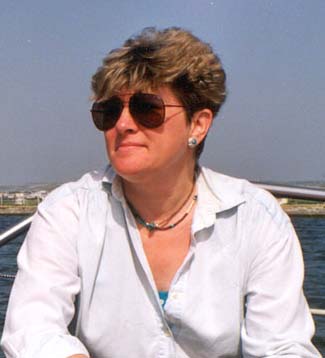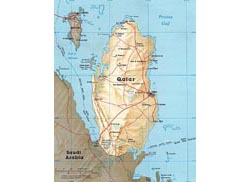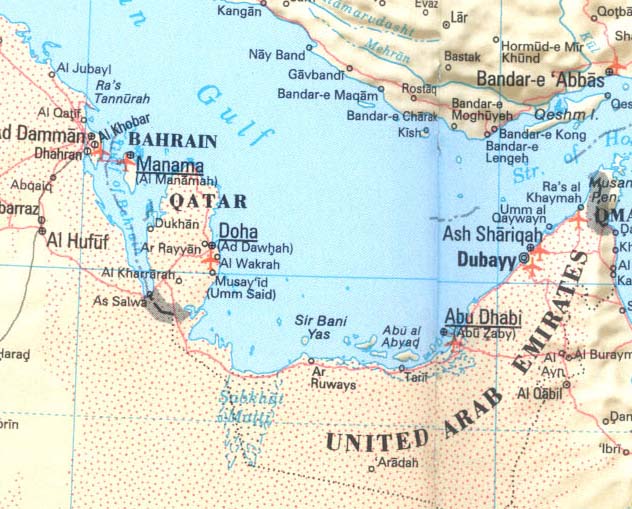
 Some things are so much the same (availability of certain foods such as Special K, Philadelphia brand cream cheese, diet pepsi, fresh fruits and vegetables) and so much different: Fresh tomatoes from Jordan, apples from Lebanon, and others fruits and vegetables from South Africa. Fresh fruit and vegetable costs are nominal, American brands naturally almost always at prices we’d see in the States but not all. Dish soap sells for 5QR, less than $1.50, screw top plastic containers for approximately $0.75, diet Pepsi can be purchased as a six-pack for 5.5 QR, approximately $1.61. Non-alcohoic beer as cheap as 8 QR for a 6-pack or $2.35 (the more expensive non-alcoholic beer at 17 QR tastes indistinguishable). Drinking water is naturally purchased but delivered large jugs are of nominal cost.
Some things are so much the same (availability of certain foods such as Special K, Philadelphia brand cream cheese, diet pepsi, fresh fruits and vegetables) and so much different: Fresh tomatoes from Jordan, apples from Lebanon, and others fruits and vegetables from South Africa. Fresh fruit and vegetable costs are nominal, American brands naturally almost always at prices we’d see in the States but not all. Dish soap sells for 5QR, less than $1.50, screw top plastic containers for approximately $0.75, diet Pepsi can be purchased as a six-pack for 5.5 QR, approximately $1.61. Non-alcohoic beer as cheap as 8 QR for a 6-pack or $2.35 (the more expensive non-alcoholic beer at 17 QR tastes indistinguishable). Drinking water is naturally purchased but delivered large jugs are of nominal cost.But water in general is a problem. Qatar is a desert peninsular country surrounded by water for much of its circumference; only the short southern border with Saudi Arabia is land. It lacks any good sources of non-saline water. In fact, from a review of a United Nations publication, we learn that
WATER crisis in Qatar, as indeed in the Gulf and the rest of the world, threatens future progress and impedes efforts to alleviate poverty. To drive this point home, the United Nations Educational, Scientific and Cultural Organisation’s Doha office has brought out a book called Policy Perspectives for Ecosystem and Water Management in the Arabian Peninsula. Fresh water resources in the region are extremely limited, and yet the demand for them is increasing. As a consequence, much of the available freshwater resources have been depleted, and in some cases polluted. Ground water levels are falling in many areas, and often lead to seawater intrusion into coastal aquifers, the book says. "In view of these stresses on existing freshwater resources, seawater and brackish groundwater are now considered essential resources for freshwater production through desalination", the editors of the book say.
And yet the air is thick with moisture and when we move from air conditioned car or building to the humid outdoors (or humid underground garage), sunglasses immediately fog up removing any visibility. In order to see, sunglasses must be removed until they warm to the outside temperature leaving eyes to the mercy of the blazing sun.
Apartments and houses have water collected on the roofs for bathing, dish washing, laundry etc. (This is a typical strategy in the Mediterranean and indeed buildings in New York City above 6 floors bring water to the roof to facilitate flow. Regarding NYC buildings, Wikipedia relates that “a distinctive feature of many of the city's buildings is the presence of wooden roof-mounted water towers. In the 1800s, the city required their installation on buildings higher than six stories to prevent the need for excessively high water pressures at lower elevations, which could burst municipal water pipes.”) I learned this week that my towers cool the water; residences in villas do not and often during the summer months, showering is unbearable due to the temperature of the water coming from the faucets or showers via the collection stations on the roof. At lunch today it was noted that the temperature has gotten mild enough (ca. 80-90 Fahrenheit peak) that it is about time to turn on the water heaters. (I recall our similar system in southern Sicily where we showered by garden hose from water on the roof – the first to shower got warm water, those after got cooler to cold.) I had thought the outdoor pool between the two towers in my Qatar apartment building would be unusable during June-July-August when the temperatures routinely reach 120-130 Fahrenheit. The pool water, I was told, is cooled making for very comfortable swimming.
An absolutely critical requirement these days is access to the internet. As I have related, I am fortunate to have DSL within my building and excellent connections at work. Yet the DSL takes longer than cable access in the States and the access at work here in Educaton City, routinely unable to find the site and having to be refreshed numerous times. In addition, working from my apartment I am recognized as coming from Qatar and have found that Sony eBooks thinks I am not a U.S. resident (I am but on the go) and will not allow me to download. I have been told that my laptop in the office will access the wireless there and present me as from New York State, home of Weill Cornell. We’ll see. Sony’s approach means of course that travelers and non-U.S. citizens in the States are free to down load eBooks. Again, go figure.
An article in this week’s issue of Arabian Business, Life in the slow lane, Andrew White, relates the size of the penetration of internet business in the mid-East – the fastest growing , yet in total it hosts only 4.5% of the world’s 772 million internet population (Qatar accounts for 1.1% of mid-East internet use). The author quotes Phil Reynolds, chief legal officer of virtual network operator Friendi Mobile, and former head of technology at international law firm DentonWildeSapte, who relates that
this weakness is largely a result of the region's high prices, which are "way, way above the European, US and Asia-Pacific benchmarks," and kept there by a lack of real competition in Middle East telecoms markets."The bottomline is that there's now scope for further competition in the market - however, the reality is that prices have not fallen, and operators are admitting that prices are relatively stable at the moment," he explains. "That indicates that full competition is not happening, as in a fully competitive environment, prices do tend towards cost."
Reynolds argues that as a result of a dearth of true competition, innovation has suffered and services have not advanced as quickly as they were expected to. Governments have focused so closely on introducing second or third operators into the market, that the region has merely seen the introduction of "cosy oligopolies, with a lot of price following occurring". Consumers are not getting the deal they deserve, and it will take the intervention of regulatory authorities around the Gulf, to kick-start the revolution."The next phase of competition has to occur where service-based competition comes in, as a layer underneath facilities-based competition," Reynolds suggests. "What we will see is regulators becoming frustrated with pricing and services, saying ‘we want some more competition, so you guys need to open your networks now to independent service providers, so we can get more innovation, and get the prices down a bit more'. The key is to move towards services-based competition, as opposed to network and facilities-based competition.
"This issue is strongly linked to the take-up of computers, so there could be a lot more activity with regards to making computers more affordable, and putting them into schools and other places," offers Reynolds, picking up the education theme. "Prices need to come down, and governments can provide subsidies and schemes, to educational institutions in particular, to encourage further take-up of PCs."
The article continues with a discussion of the market in the mid-East and interest from the IT giants:
Earlier this year, Arabian Business met Microsoft CEO Steve Ballmer in Qatar as he signed an agreement that will form the basis of a strategic partnership with ictQatar, the country's policymaking and regulatory body for information and communication technology, to transform the emirate into a successful knowledge-based economy and increase the impact ICT has on its GDP."We're serious about this region and want to showcase what technology can do to improve services within government, education, healthcare, society and the business world," Ballmer told this magazine, adding that Microsoft was preparing to invest "significant effort" into the Middle East.
So it appears, on one hand, that until there is a demand for good access, that is, a reason to have it driven more than likely by business needs first and foremost, there won’t be strong competition and users will continue to suffer. My thoughts naturally turn to the recent discussion of many Gulf citizens who are well cared for and have no real reason to work or drive the economy. On the other hand, the recognition of the market, especially in the Gulf States where great concentrations of wealth are available, bodes well for far better access in the near future.
Finally, leaving behind weighty thoughts of the future of the internet in Qatar and the mid-East, onto other essentials. The goods that I shipped arrived this week and among the mundane items of clothing and extra supplies, I was pleased to find and install the Bose Sound Dock for my iPod. I only started using the iPod when I knew I was leaving the country and now use it as a very handy way to transport my music and play in my living room or bedroom or where-ever. Evan in NYC I found myself using this player rather than the CD player. The sound dock and the four pieces for the walls (not yet hung) begin to make this place a bit more home.












